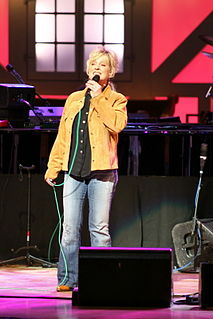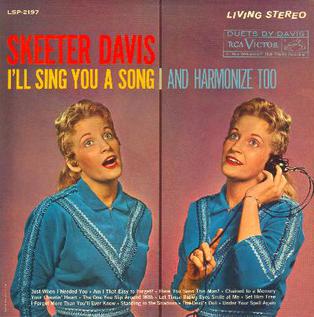Related Research Articles

Skeeter Davis was an American country music singer who sang crossover pop music songs including 1962's "The End of the World". She started out as part of the Davis Sisters as a teenager in the late 1940s, eventually landing on RCA Victor. In the late 1950s, she became a solo star.

Connie Smith is an American country music singer. Her contralto vocals have been described by music writers as significant and influential to the women of country music. A similarity has been noted between her vocal style and the stylings of country vocalist Patsy Cline. Other performers have cited Smith as influence on their own singing styles, which has been reflected in quotes and interviews over the years.

The discography of Skeeter Davis, an American country artist, consists of thirty-one studio albums, fifteen compilation albums, four tribute/cover albums, five collaborative albums, fifty-seven singles, two charting b-sides, and four singles with other artists.

I'll Sing You a Song and Harmonize Too is the debut studio album by American country artist Skeeter Davis. The album was released in November 1959 by RCA Victor and was produced by Chet Atkins. It signified Davis' first solo album ever released after departing from the duo, The Davis Sisters.

Here's the Answer is the second studio album by American country artist Skeeter Davis. The album was released in January 1961 on RCA Victor Records and was produced by Chet Atkins. The album consisted of cover versions of hit singles by country artists and answer songs to the hits.
"Lost to a Geisha Girl" is a song written by Lawton Williams. It was recorded and released as a single by American country artist, Skeeter Davis, in 1957.
"(I Can't Help You) I'm Falling Too" is a song written by Hal Blair, Skeeter Davis, and Don Robertson. In 1960, Skeeter Davis recorded and released the song as a single for RCA Victor. It was an answer song to Hank Locklin's major country pop crossover hit entitled, "Please Help Me, I'm Falling". It was Davis' second answer song in response to a Locklin tune.
"My Last Date " is a song written by Boudleaux Bryant, Floyd Cramer, and Skeeter Davis. In 1960, Skeeter Davis recorded and released the song as a single for RCA Victor. The song was an answer song to Floyd Cramer's country pop crossover hit that year titled "Last Date". Skeeter Speaks the first two lines in the Bridge section of the song.
"The Hands You're Holding Now" is a song written by Marty Robbins. In 1961, American country artist, Skeeter Davis, recorded and released the song as a single for RCA Victor.
"Homebreaker" is a song written by Skeeter Davis and Marie Wilson. In 1959, Skeeter Davis recorded and released the song as a single for RCA Victor.
"Optimistic" is a song written by Aubrey Freeman. In 1961, Skeeter Davis recorded and released the song as a single for RCA Victor.
"Where I Ought to Be" is a song written by Harlan Howard. In 1961, Skeeter Davis recorded and released the song as a single for RCA Victor in 1962.
"I'm Saving My Love" is a song written by Alex Zanetis and recorded by American country artist, Skeeter Davis in 1963.

"I Can't Stay Mad at You" is a song written by Gerry Goffin and Carole King. It was originally recorded by American country artist Skeeter Davis, becoming her second top-ten hit on the Billboard Hot 100 in 1963. "I Can't Stay Mad at You" followed on the popular success of Davis' earlier 1963 crossover hit "The End of the World". The song was one of the first Goffin-King compositions to be recorded by a country music performer.
"He Says the Same Things to Me" is a song written by Gary Geld and Peter Udell. It was recorded by American country artist, Skeeter Davis in 1963.
"Fuel to the Flame" is a song written by Dolly Parton and her uncle, Bill Owens. It was recorded and released as a single in 1967 by American country artist, Skeeter Davis.
"What Does It Take " is a song written by Jim Glaser, that was recorded and released as a single in 1967 by American country artist, Skeeter Davis. Jim Glaser was a member of the popular country music group, Tompall and the Glaser Brothers.
"There's a Fool Born Every Minute" is a song written by Paul Evans and Paul Parnes. It was recorded and released as a single in 1968 by American country artist, Skeeter Davis.
"I'm a Lover " is a song written by Ronny Light and recorded and released as a single by American country artist, Skeeter Davis. A song by the same title was written by Jay Miller much earlier; The Kinks covered it on their 1964 debut album.
"I Can't Believe That It's All Over" is a song written by Ben Peters and recorded and released as a single by American country artist, Skeeter Davis.
References
- 1 2 "Skeeter Davis discography". Praguefrank's Country Discographies. Retrieved 6 January 2014.
- 1 2 Whitburn, Joel (2004). The Billboard Book Of Top 40 Country Hits: 1944-2006, Second edition. Record Research.
- ↑ "2013 Hall of Fame Inductees" (PDF). Kentucky Music Museum. Retrieved 6 January 2014.
| This 1950s country song-related article is a stub. You can help Wikipedia by expanding it. |